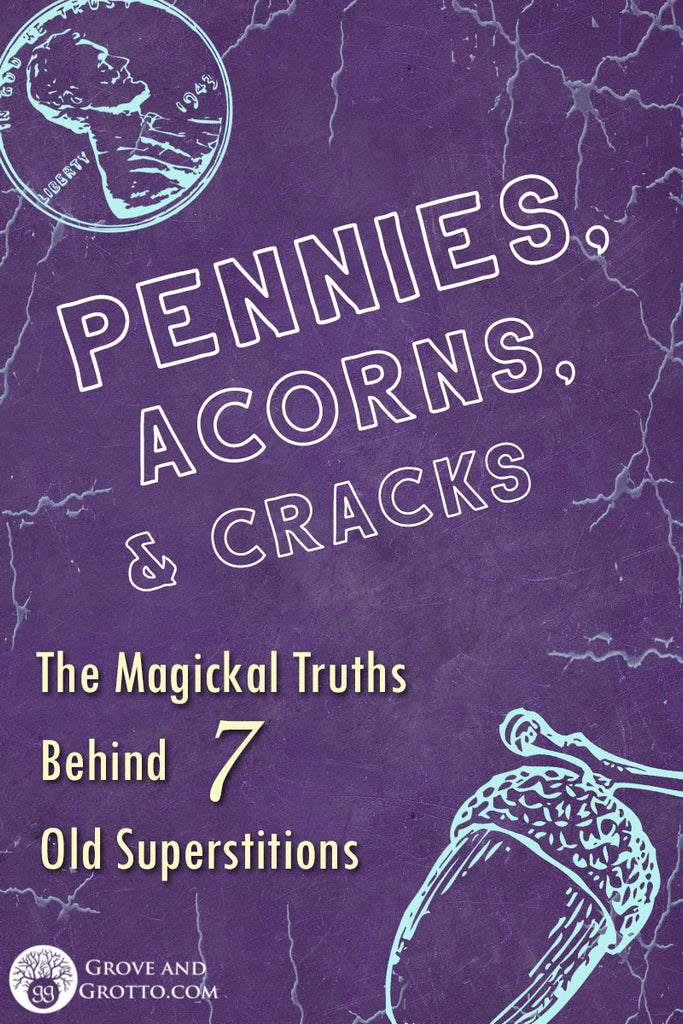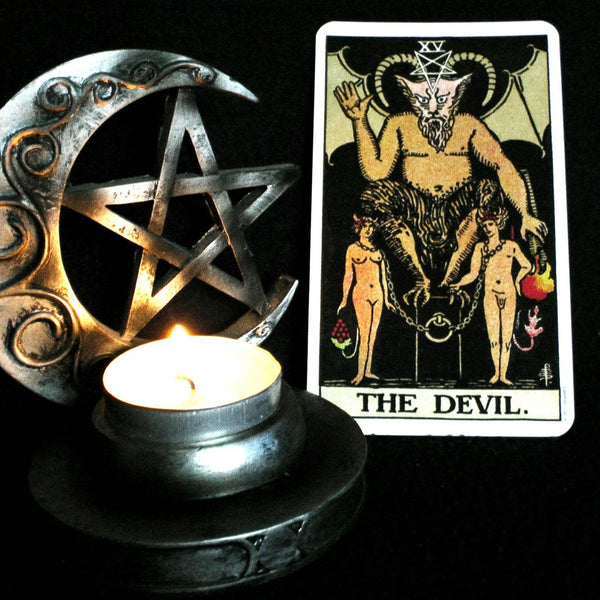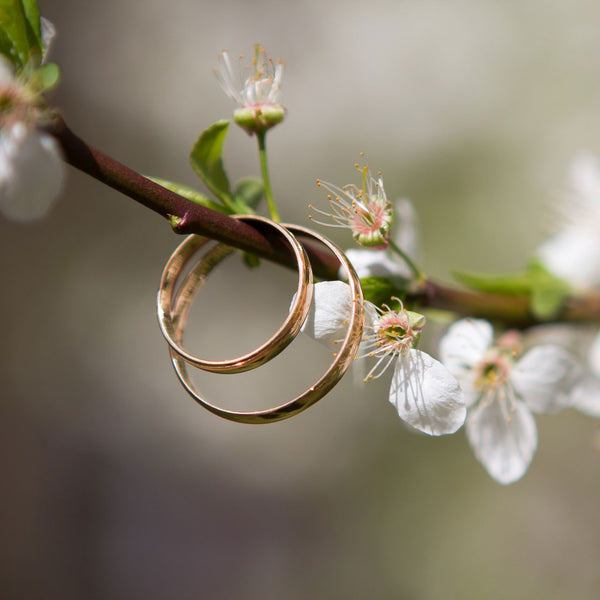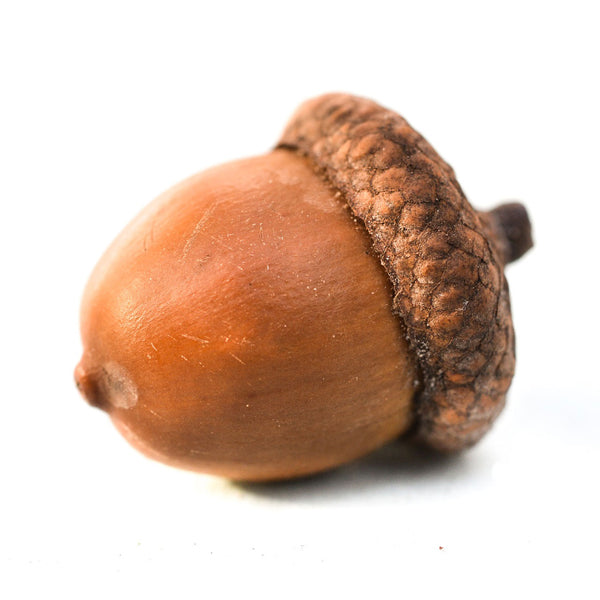
"I don't really believe in it, but I'll do it just in case." That's the definition of a superstition. Even though such practices seem quaint or illogical, some part of you feels that you should heed them...just in case. Superstitions are remnants of old occult beliefs preserved in folklore for the rational age.
If you practice magick, as I do, it's easy to see that many folk sayings conceal old truths about how magick works. Their core ideas are so old and so true that they cannot be erased. Though we may think of them as relics of a religious past or as silly lies told to children, they offer precious secrets about how to work our Craft more effectively.
In this article, we'll consider seven old wives' tales and the universal magickal principles hidden in these "outdated" beliefs.
1. Speak of the devil

The full version of this old English saying is, “Speak of the devil and he doth appear.” It was originally meant as a pious warning against summoning Old Scratch. In current speech, it’s used jokingly when the object of a conversation suddenly enters a room: “Did you hear what David did yesterday? Oh, speak of the devil—here he is.”
This old-fashioned little saying conceals an esoteric truth: Names have power. To speak the name of a being, even casually, is to invoke it. This is one reason why many ancient prayers consist of little more than a long list of divine names. It’s also why we have so many euphemisms for figures like the devil, and why so many of the gods have secret names.
Even if you don’t believe in the devil, demons, angels, or gods, the principle behind “speak of the devil” applies to human interactions, too. Words and even thoughts about another person attract their attention on a quantum level. If you gossip or talk negatively about someone, some part of their soul’s intuition will know it. (They may even walk into the room at exactly the wrong moment and embarrass you!) The idea that a person’s ears tingle or burn when they’re being talked about is a related belief.
“Speak of the devil” has a New Age corollary. It goes something like, “Don’t talk about negative things if you don’t want to manifest them.” Some believe that talking about ill effects—whether it’s a car wreck or an ulcer—is enough to draw that particular misfortune to yourself.
As magickal initiates know, energy follows thoughts, and thoughts follow words. While human magick isn’t as simple as speaking your desires into existence, beginning with the right speech is a critical first step.
2. Spilled salt

If you accidentally spill salt—for instance, by knocking over a salt shaker—bad luck will surely follow. The only way to keep it away is to throw a pinch of the salt over your left shoulder. One belief is that the devil (who is always creeping behind your left shoulder) will be chased away by the salt.
This superstition is centuries old, and may even date to Roman times. Leonardo DaVinci referenced it in his famous painting of the Last Supper, in which a spilled salt cellar can be seen next to the arm of Judas Iscariot. Salt was prized in ancient and medieval times as an emblem of sanctity—as well as a necessary commodity for preserving food. In inland settlements, salt could be expensive and rare. To spill or waste it suggests corruption, wantonness, and impurity.
The modern Witch knows that salt is a peerless magickal tool. Salt cleanses and purifies, it grounds and protects. It is a pure expression of the Earth element. Flouting superstition, some Witches intentionally spill or scatter salt, particularly in home-blessing and warding spells.
What about accidental spills? These days, salt is mundane and plentiful, and we no longer need added salt to keep our food safe to eat. Overturning the salt shaker at Denny’s should be a non-issue, and most Witches don’t believe in the devil. And yet, you will sometimes still see witchy folks toss a pinch of salt over their shoulder.
Why? Well, it’s a habit, for one thing. It can’t hurt. But I think it’s more than that. Doing a tiny act of penance for the sin of spilling salt is a way of reminding ourselves that we still rely on it. No matter how cheap and accessible food and salt and water have become in the industrialized world, we would all die miserable deaths without them. Magickal people feel awareness of (and gratitude for) Earth’s gifts and the body’s material necessities. To take these things for granted is to invite…if not bad luck, then a sense of disconnection and spiritual malaise.
3. The swing of a ring

This old wives’ tale involves tying a ring to a string and dangling it over the belly of a pregnant woman. (It’s best if it’s a wedding ring belonging to the couple that conceived the child.) If the ring moves in circles, the baby is a girl. If it swings back and forth in a straight line, it’s a boy.
Before prenatal medical screening, women relied on this and other superstitions to determine the sex of an unborn child. Recently, mommy bloggers have re-introduced the ring-on-a-string method to the public, with mixed results. (Obviously, doctors insist that the only accurate way to determine an unborn baby’s anatomy is with an ultrasound.)
The magickally inclined among us will recognize the swinging ring for what it is—a makeshift pendulum! A pendulum is a device for accessing intuition and is frequently used to answer yes-or-no questions. Pendulums work by bypassing the conscious mind and allowing the truth to be expressed through involuntary muscle movements. Anything can be a pendulum if it’s weighted and allowed to dangle.
The iffy record of the ring-on-a-string illustrates the principle that magick is in the person, not in the tool. Pendulums can be very accurate, but they are only as accurate as their user. In the hands of a skilled intuitive, a pendulum could absolutely be used to determine the sex of a child. In the hands of your average unpracticed person…eh, its probably about 50-50.
4. Picking up pennies

“See a penny, pick it up, and all the day you’ll have good luck. See a penny, let it lay, and bad luck you’ll have all day.” So goes the popular rhyme. Even though the hassle of dealing with pennies long ago eclipsed their worth as a currency, there are plenty of people who just cannot leave a coin lying on the pavement.
Some say this old superstition comes from the belief that metals were originally gifts from the gods, and therefore lucky. Other theories are rooted in practical magick: If you discard a token of wealth, even a small one, then opportunities for financial gain will surely pass you by. “Don’t keep your purse on the floor or you’ll stay broke,” is an Afro-American folk belief that follows similar logic. Pennies are made mostly of copper—a Venus metal—so to spurn a penny is to reject love and money in a single pass.
I am wholeheartedly a penny picker-upper. (Nickels, dimes, and quarters, even more so!) When I was a child, I’d occasionally find Mexican pesos on the sidewalk or at school. Although they were next to worthless at that time, I thought they were exotic treasure and would hoard them away in a little box. There is something that just feels lucky about finding any sort of coin.
The coin occupies an important place in the Witch’s toolkit, as an emblem of prosperity and the element of Earth. The coin combines a natural resource (metal) with human inventiveness and intellect (the concept of currency) to create something we all know and love: Money.
Ever since its invention several thousand years ago, the coin is recognized as a source of power by almost every creature that walks on two legs, and many non-corporeal beings, as well. With both a front and back side, the coin embodies the paradox of duality—two things that make up the One Thing. As a magick worker, what’s not to like?
Coins are sometimes used as offerings to spirits and gods. This probably comes from early funeral customs, when coins were placed with the body to pay for the dead person’s journey or ensure he was well-funded in the afterlife. The ancients also placed coins in springs, streams, and lakes as offerings to nature spirits—a practice that has morphed into the modern-day practice of tossing coins into fountains. Conversely, some people interpret found coins as gifts from the spirit world. The “pennies from heaven” phenomenon is recorded in countless heartwarming anecdotes from people who believe the coins are signals from deceased loved ones.
What does it mean when you find a coin? As the rhyme has it, it’s an omen that good luck (especially of the financial kind) is about to flow your way. Finding a coin with your birth year on it is especially fortunate, and such a coin should be immediately placed in your wallet as a lucky charm. (Don’t drill a hole in the coin, though—holes will cause all the luck to “drain out”.)
If you practice coin magick for any length of time, some types of coins may acquire special significance to you. I often find a coin (especially a nickel) at my feet when my spirit guides want to remind me to take care of my energy and to ground. Rare and unusual coins often carry a message from Spirit. Pay attention to the metals, the dates, and any symbols that jump out to you. (State quarters—with their buildings, birds, and flowers—can be fabulously expressive!) If the meaning isn’t obvious to you right away, place the rare coin on your altar for further consideration.
You can also use coins for divination, and coins found by chance are said to be best for this task. As Lon Milo Duquette writes (in The Book of Ordinary Oracles), coins are one of the handiest little divination tools ever conceived. A coin is binary: It will (almost) always land either upright or upside-down, so it’s perfect for answering yes-or-no questions.
If flipping a coin seems rather un-magickal, you can always leave the coin oracle in the hands of the Universe. Formulate your question, then go about your business. The first coin you see on the ground will be your omen: If it’s heads, the answer is yes. If it’s tails, the answer is no.
Certain coins should be left alone: Coins found in graveyards are usually offerings to the dead and must only be removed by caretakers. Coins in fountains and outdoor water features may belong to nearby Fae and should also be undisturbed by passers-by.
5. Stepping on a crack

Yet another superstition expressed in a child’s rhyme: “Don’t step on a crack or you’ll break your mother’s back.” This is a folk belief with many variations, including “Step on a line, break your father’s spine,”—or that the number of lines stepped on equals the number of broken bones that poor Mama will suffer.
The myth that stepping on cracks in the ground will bring misfortune to you or your family is common in the Americas and in Europe. A 2010 survey in the UK found that 1 in 20 adults currently avoid stepping on sidewalk cracks, even though they admit that doing so is irrational.
Long ago, people believed that cracks and crevasses were gateways to the underworld. They were boundaries between the world of the living and the world of spirits, places where danger could lurk. It is said that Persephone was spied upon and abducted by Hades through a fissure in the ground. People thought that putting a foot on a crack might disturb a witch or demon who could then fly free and cause mischief.
Modern-day Witches realize, of course, that there is no causal relation between walking on sidewalk cracks and spinal injury. But we also know that cracks and ground fissures are examples of liminal space—the in-between places where magick tends to congregate. We also know that underworld journeys, spoken of in so many of the world’s mythologies, are real spiritual ordeals that should be undertaken deliberately and with great reverence.
Unnoticed by most pedestrians, a sidewalk crack is an opportunity to contemplate the vast world of Earth and Fire underneath our thin human infrastructure. Are such gateways unlucky? Not necessarily. But mindlessly stepping on a crack is a metaphor for stumbling unaware into the threatening and transformative realms of the unknown.
6. Carrying an acorn

The Oak tree is famous for its robust health and long life. In medieval times, people would carry an acorn for longevity, a superstition still practiced in some parts of the world today. Acorn motifs also appear on pocket charms and talismans for health and good luck.
The acorn charm is a textbook example of sympathetic magick. It’s probably one of the first spiritual principles ever devised by humans, and it is still at the core of most kinds of witchcraft.
Sympathetic magick is the magick of correspondence. Key concepts include:
1. Similar objects act on each other at a distance, even though a physical link may not exist.
2. Parts (of a plant, animal, mineral) contain the essence of the whole.
3. A symbol or representation of an object can stand in for the object itself.
Carrying an acorn may seem silly if you lack a connection with this specific tradition. But if you indulge in any spellwork or possess any lucky objects, you are probably participating in a form of sympathetic magick.
7. Knocking on wood

The superstition of “knock on wood” or “touch wood” originates in Britain and is also widespread in Ireland, Australia, New Zealand, and South Africa. To avert bad luck, you are supposed to touch a wooden object whenever you speak of good fortune or express a hope for the future. The tradition, some say, comes from an old Pagan belief that envious or malevolent spirits who dwell within the wood might overhear your boasting and bring misfortune upon you.
Another theory is that the wood has protective qualities. In this version, you “touch wood” not to pacify evil spirits, but to request the protection of benevolent ones. Green Witches know that tree spirits can make powerful magickal allies if you cultivate relationships with them. Energy workers know that wood acts as both an insulator and a conduit and is useful for gently grounding one’s energy. To “touch wood” is one way to anchor yourself. Grounding with a physical object helps to seal your energetic field off from any psychic interference. (Similarly, Italians “touch iron” when trying to avoid tempting fate.)
There is another magickal truth bundled up in “knocking on wood”—that is, the concept of magickal silence. It’s not just Witches who practice magickal silence: Around the world, it is considered bad luck to talk about wealth, success, and health out loud, especially when it concerns a future event. Many people believe in the Evil Eye, jealous ghosts, and unruly spirits—but even skeptics will joke about “jinxing” oneself by boasting too early of some future triumph.
Careless speech, for whatever reason, does seem to affect the outcomes we experience as luck. Seasoned magick workers know that talking or writing about a spell working (either before or after) is one of the quickest ways to mess the whole thing up. Keeping your mouth shut is the first and final step of successful magick. But it’s hard! When you’re proud or happy or brimming with anticipation, sometimes the words just pop out. Knocking on wood is a time-honored way of expressing gratitude for good luck…and apologizing for the magickal faux pas of mentioning it.
The more I think about old wives’ tales and superstitious beliefs, the more I realize that many share fundamental principles with magick as I understand it. Visit again for the second installment, where we'll consider broken mirrors, birthday wishes, and more!
Read more articles here.
